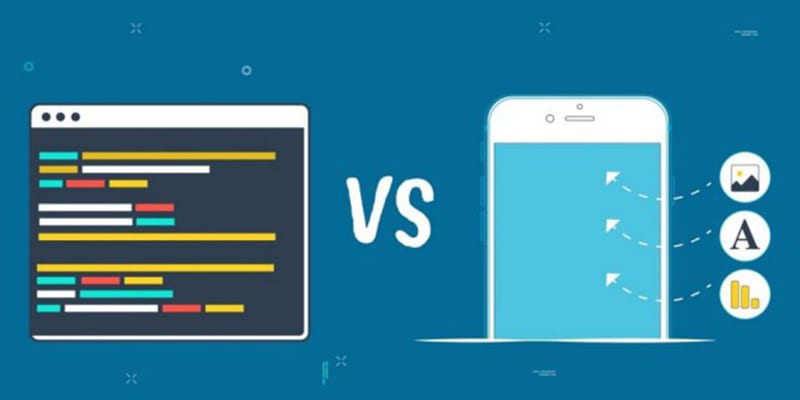PAGE EN COURS DE RÉDACTION - TEXTE FRANÇAIS À VENIR

There are many commercial “No-code” and “Low-code” tools and new products keep appearing on this expanding market.
No-code tools allow a business user to build a complete App by defining data sources and the specifications of each data element and how these relate to each other, then defining various views to interact with the data following some rules, all this without programming.
Low-code tools allow users to quickly create the main components of an App, but then require the user to write some code in order to connect the components and build a complete App. The amount of code needed varies between tools and the most complex ones are targeted at professional developers to act as productivity boosters allowing them to build Apps much faster compared to using full stack programming tools.
Among No-code / Low-code tools, we are looking specifically at those that allow business users to build mobile apps. The research firm Forrester published a report in August 2018 titled “The Forrester Wave : Mobile Low-Code Platforms For Business Developers, Q3 2018” that identifies the 12 most significant products in this category and the 3 leaders : Microsoft-Powerapps, AppSheet and Betty-Blocks.
Our typical utilization scenario for a given App is to automate a few business processes in a workgroup of up to approximately 100 users, including those internal and external to the organization. The App may manipulate many data tables, provided that their contents and relationships are properly defined and structured.
We chose AppSheet as our No-code / Low-code tool because :
AppSheet is No-code and intelligent such that it generates an App automatically from your tables contained in a spreadsheet. The App can then be easily extended and customized with no coding required. AppSheet allows unlimited Apps and rich functionality at a reasonable price per user, which is ideal for our target scenario.
The mobile Apps built with AppSheet are usable online and offline, which is essential in locations where the device’s Internet connection is temporarily unavailable. This offline capability is quite unique in No-code tools.
AppSheet was founded in 2014 and currently has 6000 customers. More than 200,000 apps have been deployed using AppSheet.
AppSheet has a very active user community with a monthly average of 600 posts and 2600 replies.
We discarded the other tools as inappropriate for our scenario :
Microsoft-PowerApps offers two different types of apps : Canvas Apps and Model-driven Apps.
PowerApps Canvas Apps are Low-code and require a lot of manual editing when you have many tables and extensive functionality; Canvas Apps are better suited for simple business tasks with only a few database tables, that require a highly customized UI.
PowerApps Model-driven Apps are targeted by Microsoft for visualizing and managing complex business processes using elaborate dashboards. Model-driven Apps are No-code and the editor can quickly generate an App from many tables, but these apps have a fixed generic UI (user interface) which does not guide end users in their tasks, and are therefore ill-suited for our typical scenarios.
Betty-Blocks has a pricing model based on the quantity and functionality of Apps rather than on the number of users. This incurs a relatively high monthly licence cost as soon as the organization begins using this platform, which is difficult to justify financially before some Apps have been deployed widely and have been proven useful.